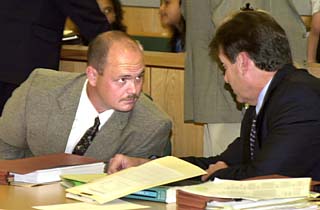APD Case Moves Forward
A judge rules in favor of an attorney who claims that APD engages in selective prosecution of officers. Attorney Steve Edwards now must collect evidence -- and his number one goal is to get Chief Stan Knee to testify.
By Jordan Smith, Fri., July 5, 2002

After being ensconced in her office for nearly an hour of additional deliberation, Travis County District Judge Julie Kocurek ruled June 28 that defense attorney Steve Edwards may pursue evidence to back his claim that the Austin Police Dept. engages in selective enforcement. "The court finds there is a numerical and statistical difference [between the number of younger officers referred for prosecution and the number of veteran officers who are not], and it is a significant difference," she said. "Therefore, the court finds that the defense is entitled to further discovery."
Edwards hopes to have thrown out the indictment of former APD Officer Eric Snyder, charged in 2000 for official oppression. Prosecution of the three-year officer, Edwards says, illustrates a pattern of selective enforcement by APD officials. Kocurek's ruling does not affirm Edwards' claim, but allows him to gather evidence.
At the top of Edwards' discovery list is a subpoena of APD Chief Stan Knee. Predictably, the city opposes that step -- but will have to wait to protest, for just as Assistant City Attorney David Douglas was preparing to make his case before the court Friday, he collapsed and lost consciousness after hitting his head on the edge of the jury box. (Douglas regained consciousness, and with the help of court officers, including Kocurek, was removed from the courtroom.) Kocurek reset the hearing for July 18. Edwards also will reargue a motion for the city to produce 10 years' worth of internal affairs records related to complaints against officers for excessive use of force. Originally, Kocurek denied this request, but now that Edwards has won the right to proceed, the motion is back on the table. (Douglas had opposed the request, arguing in part that compiling the documents would be "burdensome" to APD staff.)
In order to win Friday's ruling, Edwards had to show a pattern of inconsistencies that suggested disparate disciplinary treatment is occurring -- legally, a prima facie showing. He cited 22 cases in which officers had committed offenses similar to Snyder's, only four of which were ever forwarded to the district attorney's office for prosecution. He also entered into evidence portions of an arbitration hearing transcript from February 2000, during which Chief Knee testified that APD has no written guidelines standardizing disciplinary sanctions, and a portion of the arbitrator's decision chastising the department for its lack of progressive sanctions and recommending that the city implement such a system. Edwards also got former APD Detective Gary Fleming, an 18-year veteran with the department's Internal Affairs Division, to testify that experience, rank, and reputation among administrators largely determined whether an officer would receive any discipline, or if a case was forwarded for prosecution.
Edwards also had to show that Snyder belongs to a legally "protected class" with standing to bring a selective prosecution or selective enforcement claim. Historically, "protected class" has pertained to people of a particular race or religion. Edwards argued that police officers are a class receiving unequal protection under the law -- a violation of the 14th Amendment of the U.S. Constitution. As a subclass, younger officers deserve the same protection as their veteran counterparts, he said.
Despite some persuasive arguments by Assistant District Attorney Bill Bishop, Kocurek ultimately agreed Edwards had produced "credible evidence" that inconsistencies were occurring, and that "similarly situated individuals" were not prosecuted with the same vigor. Further, she said that she believed the U.S. Supreme Court has broadened the definition of a protected class so that Snyder does have the right to bring the claim. However, the court is not commenting directly on Snyder's claim at this time, she added.
Got something to say on the subject? Send a letter to the editor.








